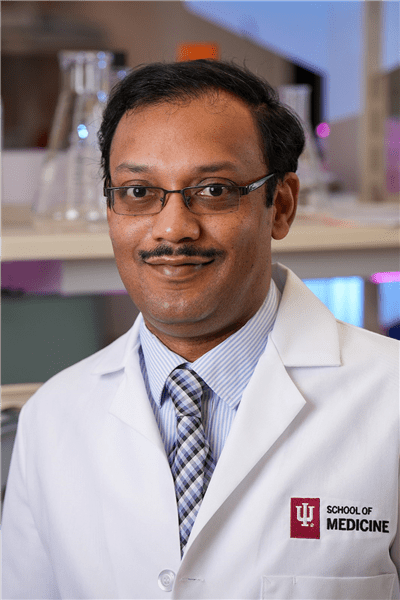
Mithun Sinha, PhD
Assistant Professor of Surgery
Adjunct Assistant Professor of Microbiology & Immunology
- mitsinha@iu.edu
- Phone
- 317-278-2713
- Address
-
635 Barnhill Dr.
VanNuys Medical Science Building # 2051
Indianapolis, IN 46202 - PubMed:
-

Bio
Dr. Sinha currently serves as Assistant Professor of Surgery at Indiana University School of Medicine. He also serves as the Research Director for the IU Wound Center. He received his doctoral degree in Biotechnology from University of Calcutta, India. Prior to joining Indiana University, Dr. Sinha did his post-doctoral training at The Ohio State University, Columbus, Ohio. Dr. Sinha’s research focuses in the areas of implant associated complications and wound healing. He has published over 50 peer-reviewed articles.
Key Publications
1. Khan I, Timsina L, Chauhan R, Ingersol C, Wang DR, Rinne E, Muraru R, Mohan G, Minto RE, Van Natta BW, Hassanein AH, Kelley-Patteson C, Sinha M. Oxylipins in Breast Implant Associated Systemic Symptoms. Aesthetic Surgery Journal 2024. doi: 10.1093/asj/sjae128. PMID: 38857184.
2. Khan I, Minto RE, Kelley-Patteson C, Singh K, Timsina L, Suh LJ, Rinne E, Van Natta BW, Neumann CR, Mohan G, Lester M, VonDerHaar RJ, German R, Marino N, Hassanein AH, Gordillo GM, Kaplan MH, Sen CK, Kadin ME, Sinha M. Biofilm derived oxylipin 10-HOME mediated immune response in women with breast implants. Journal of Clinical Investigation 2023 Nov 30: e165644. doi: 10.1172/JCI165644. PMID: 38032740.
3. Suh LJ, Khan I, Kelley-Patteson C, Mohan G, Hassanein, AH, Sinha M. Breast Implant Associated Immunological Disorders. Journal of Immunology Research 2022. DOI: 10.1155/2022/8536149. PMID: 35571560.
4. Mohan G, Khan I, Diaz SM, Kamocka MM, Neumann CR, Jorge MD, Gordillo GM, Sen CK, Sinha M, Hassanein AH. Quantification of Lymphangiogenesis in the Murine Lymphedema Tail Model Using Intravital Microscopy. Lymphatic Research and Biology 2024 May 3. doi: 10.1089/lrb.2023.0048. PMID: 38699876.
5. Mohan G, Khan I, Neumann CR, Jorge MD, Ahmed S, Hulsman L, Sinha M, Gordillo GM, Sen CK, Hassanein AH. Topical Tissue Nanotransfection of Prox-1 is Effective in the Prophylactic Management of Lymphedema. Molecular Therapy- Nucleic Acids 2024 Jan 18;35(1):102121. doi: 10.1016/j.omtn.2024.102121. PMID: 38333673.
6. Sinha M*, Ghosh N, Wijesinghe DS, Mathew-Steiner SS, Das A, Singh K, El Masry M, Khanna S, Inoue H, Yamazaki K, Kawada M, Gordillo GM, Roy S, Sen CK*. Pseudomonas aeruginosa Theft Biofilm Require Host Lipids of Cutaneous Wound. Annals of Surgery 2022. doi: 10.1097/SLA.0000000000005252 (*co-corresponding authors). PMID: 35129518.
7. Sinha M, Sen CK, Singh K, Das A, Ghatak S, Rhea B, Blackstone B, Powell H, Khanna S, Roy S. Direct conversion of injury-site myeloid cells to fibroblast-like cells of granulation tissue. Nature Communications 2018; 9 (1): 936. DOI:10.1038/s41467-018-03208-w. PMID: 29507336.
8. Singh K, Sinha M, Pal D, Tabasum S, Gnyawali SC, Kona D, Sarkar S, Mohanty SK, Soto-Gonzalez F, Khanna S, Roy S, Sen CK. Cutaneous epithelial to mesenchymal transition activator ZEB1 regulates wound angiogenesis and closure in a glycemic status dependent manner. Diabetes 2019, Nov;68(11):2175-2190. DOI: 10.2337/db19-0202. PMID: 31439646.
9. Gallego-Perez D, Pal D, Ghatak S, Malkoc V, Higuita-Castro N, Gnyawali S, Chang L, Liao W, Shi J, Sinha M, Singh K, Steen E, Sunyecz A, Stewart R, Moore J, Ziebro T, Northcutt R, Homsy M, Bertani P, Lu W, Roy S, Khanna S, Rink C, Sundaresan V, Otero J, Lee LJ, Sen CK. Topical tissue nano-transfection mediates non-viral stroma reprogramming and rescue. Nature Nanotechnology 2017; 12 (10), 974-979. DOI: 10.1038/nnano.2017.134. PMID: 28785092.
10. Das A*, Sinha M*, Datta S, Abas M, Chaffee S, Sen CK, Roy S. Monocyte and macrophage plasticity in tissue repair and regeneration. The American Journal of Pathology 2015, 185 (10), 2596-2606. DOI: 10.1016/j.ajpath.2015.06.001 (*joint first authors). PMID: 26118749.
| Year | Degree | Institution |
|---|---|---|
| 2017 | Fellowship | The Ohio State University |
| 2012 | PhD | University of Calcutta |
| 2005 | MS | University of Calcutta |
| 2003 | BS | University of Calcutta |
Dr. Sinha’s laboratory at the Center for Surgical Sciences (CSS) focuses on implant-associated immunological complications and wound healing. His research focuses on implant-associated complications due to biofilms and impairment of wound healing outcomes due to bacterial biofilm. His laboratory studies dental implant associated peri-implantitis, breast implant associated systemic immunological manifestations and orthopedic implant associated osteomalacia. His team focuses on Breast implant-associated complications like breast implant illness (BII) or Systemic symptoms associated with breast implants (SSBI). The current line of study aims to decipher lymphocyte activation via lipid mediators formed by implant-associated bacterial biofilm. Wound healing and skin repair studies are focused on the bioengineering aspect of healing. He conducts wound healing studies exploring host-biofilm interaction-mediated metabolites. In addition, his laboratory explores the development of implant-based biomaterials for their anti-biofilm properties. Over the past decade, he has actively collaborated with clinicians (surgeons, podiatrists, orthodontists, physical therapists), chemical and material science engineers. Seven of his publications have been cited 100+ times. His study on breast implant associated immunological complications published in the Journal of Clinical Investigation (PMID: 38032740) has received editorial type commentary from the peer community (PMID: 38299590).
Grants
- NIH/ NIAID RO1AI165958 (Role-PI)
- NIH/ NIAID R21AI171932 (Role-PI)
- Plastic Surgery Foundation (PSF) 831458 (Role- PI)
- IU-PU Engineering in Medicine Grant- ENGM7 (Role- mPI)
- NIH/ NIAMS R21AR082600 (Role- Co-I)
PubMed link:
https://www.ncbi.nlm.nih.gov/myncbi/mithun.sinha.2/bibliography/public/
Google Scholar link:
https://scholar.google.com/citations?user=M8gA5LIAAAAJ&hl=en
Social media video links:
https://www.youtube.com/watch?v=003Tjf7A7Kw&t=160s